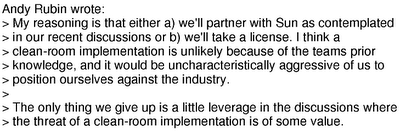This article is more than 1 year old
Why Oracle will win its Java copyright case – and why you'll be glad when it does
Open source needs strong copyright; weak copyright only helps bullies
A 'confused' judge was covering his ass
The circumstances of the verdict are strange and narrow. We have a somewhat red-faced Judge William Alsup, seeking self-vindication after his earlier reasoning was subsequently dismantled [PDF] by an appeals court. Judge Alsup had presided over the original trial, which reached a hung verdict in 2012. He'd instructed the jury to exempt APIs from copyright. At the retrial that ended last week, Alsup steered the jury to make a very narrow verdict. They had to answer only one question: whether a mitigation of fair use could be claimed.
In effect, Alsup was using the jury to mark his earlier homework, but advising them that there was only one acceptable answer: that Alsup was right.
In this context, all the jury's verdict means is: "We Really Don't Care." We don't care that Google didn't have a license, they were saying, and we don't care how much it copied. In Oracle's appeal hearing – which is most likely to happen next year – three experienced judges will be obliged to address the full picture, and like all good courts, they're sympathetic to property rights. The same judges were sympathetic to Oracle in 2014, when they tossed out Google's argument that the APIs enjoy some special exception from copyright.
That's what the verdict was about. So why was there so much confusion?
Copyrightability of APIs is FUD. Just ask SCO how well that went...
In 2012, Oracle appealed the original decision, seeking clarification on whether APIs were copyrightable. The appeals court concluded that without a statutory limitation or exemption just for APIs, Oracle's software interfaces had to fall under copyright. There couldn't be any other reasonable conclusion.
A great deal of FUD has been generated by Google (and its supporters, like the activist Professor Pamela Samuelson), over the issue of the "copyrightability" of APIs. In actual fact, the "copyrightability of APIs" hasn't changed since the 1976 Copyright Act came into force. And the law hasn't changed since SCO tried to use APIs in its Linux litigation - and lost.
The SCO case demonstrates that simply because APIs have always been copyrightable, it doesn't follow that APIs can be successfully deployed as the basis of an infringement claim. Think about it. Copyright requires the arrangement of a creative work or expression to be original, and pointing to an odd piece of code here or there doesn't cut it. Words are "copyrightable". But that doesn't mean we can "copyright" a word like "cloudobile", or "Itanic", and file for infringment. It isn't enough. The same goes for APIs. Google's copying of Java was so extensive, at 11,000 lines, that it knew it needed a license. Rubin said so himself.

The appeal hearings into Alsup's handiwork shed much light on the matter, with Judge Kathleen O'Malley scolding Google for muddying the waters. Fair use doesn't belong in upfront discussions about whether or not something is subject to copyright. Nor does the ability to copyright a piece of work change because the work becomes popular. Faced with Google's cuttlefish strategy, O'Malley said, Alsup had "confused" matters.
Well, don't rule out just how much some people want to be confused about copyright, and in fact willingly seek out confusion, because it lends support to their dystopian or conspiratorial political position. It's that persecution complex we keep reminding you about – persecution complexes fall apart when the sufferer realizes they're not actually being persecuted. A guilty verdict for Google wouldn't have ushered in a new IP regime where interfaces are copyrightable, because the 2013 hearings established that interfaces were already copyrightable. Nor is there a chilling effect on past or present work.
Google's cuttlefish strategy requires free software supporters to be fearful and irrational. That's not compulsory, by the way. And if you're at all serious about defending open-source software, it isn't really a sensible state of mind. ®
Bootnote
Consultant Florian Mueller's coverage at FOSS Patents has been far more sober and accurate than the mainstream pros. For example: the New York Times warned of a dark era of copyrightable APIs, but based this dystopian prediction on just one expert source. That turned out to be one of Google's favorite professors, Pamela Samuelson. Samuelson participated in the astroturf shill group the Authors Alliance designed to defend the ad giant in the Google Books case.
Although Mueller has consulted for companies including Oracle and Microsoft, he says he hasn't consulted for Oracle since last year. He simply reads what the law is, and isn't, and thus finds himself in a strangely unpopular place. But we live in a conformist age, where the Enlightenment practice of thinking about something from first principles, and even thinking for yourself, nullius in verba, has been replaced with: "Gee. What's the correct opinion to hold, here?"
